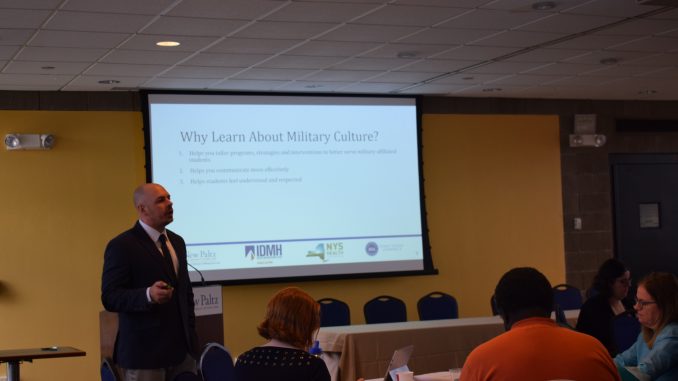
An effort to help military-affiliated students feel more understood and included on campus has been interwoven into the current services provided by several colleges.
There are currently 8,000 to 10,000 military-affiliated SUNY students; meanwhile, 19 percent of New York healthcare providers screen for this affiliation and 25 percent meet military cultural competency requirements. Military-affiliated students fall into three categories: veterans, those who are currently in service and child or spousal dependents of service members.
Initiated on Jan. 1, the Military Cultural Competency program aims to raise awareness towards the presence of the 416 military-affiliated students at SUNY New Paltz and the additional number found on other college campuses. In order to do this, a proposal was written by three SUNY New Paltz staff members Jason Gilliland, veteran and military services coordinator, Amy Nitza, institute director of the disaster mental health department and Rebecca Rodriguez, program and operations manager for the Institute Disaster Mental Health Department. They were awarded a grant from the NYS Health Foundation of $142,332.76 to fully fund the program.
Following this, Gilliland, Nitza and Rodriguez delivered surveys to health and wellness professionals 19 campuses to grasp a better understanding of students’ needs and current relationships with campus resources. Five focus groups were also held: two student-focused ones in New Paltz, two more in Buffalo and one involving veteran coordinators.
“I guess the ‘aha’ moment was that these students feel so different from their peers. They just feel really isolated, so they translate that into campus services not really understanding and not being able to provide them with support,” Rodriguez said. “What we’re trying to do is bridge that gap.”
Training sessions specific to this mission were held at five colleges in October: SUNY Buffalo, Hudson Valley Community College, SUNY New Paltz, SUNY Oswego and SUNY Stony Brook. Fourty-one different colleges were represented at these trainings and 17 SUNY New Paltz staff members were trained among the roughly 90 professionals in attendance.
These trainings presented four main objectives: understanding military culture, the needs and strengths of military-affiliated students, barriers to these students seeking services and strategies to provide better services for these students. These topics delved into the strengths of military-affiliated students, like their heightened dedication and value found in education, as well as their tendencies, like their driven nature to move past traditional student concerns of papers and deadlines and not seeking out professional help, even when they may feel overwhelmed.
“They see themselves as really being able to suck things up or get over barriers,” Rodriguez said. “They’re an army of one. They’re trying to do it all themselves.”
Student panels and video vignettes were featured at these trainings to “amplify the student voice,” according to Rodriguez. The primary audience was geared towards professionals within the career resource center, disability resource center, health center and psychological counseling center. The grant team members desire to educate these departments of the ways they can specifically help these students, such as including military status questions on their intake forms and understanding the differences between the army and navy military forces.
“It’s the duty of the department to show the student how they can better serve them,” Gilliland said. “If you understand the culture of the military then your programming efforts will be more tailored to meet those needs and that’s what we’re looking for.”
The grant team members are pleased with the positive reactions they have received from those involved in these training sessions. Gilliland hopes that these trainings will extend to a few more locations, potentially including CUNY colleges and more upstate and central New York areas in February.
“[There will be] more of a want to go and actually use the resources,” said fourth-year political science major Natalie Stewart, who is involved in the Army Reserve. “I feel like now they’ll actually be able to help me. People will kind of interact or understand better how we speak and our issues that we’re dealing with and how they differ from the normal student population.”

